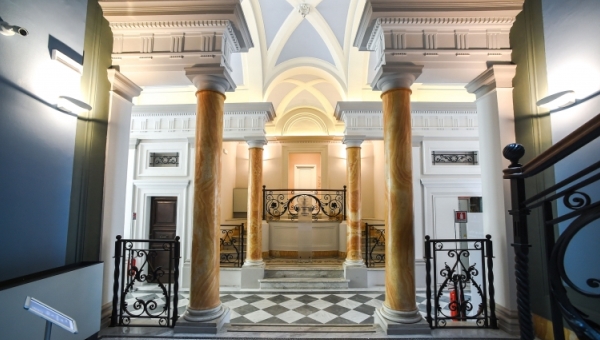JCU Welcomes Three Alumni for "Gender, Family, Future: A Cabot Case"
John Cabot University welcomed Giosuè Prezioso, Sofia Peri, and Alexandria J. Maloney for the talk called “Gender, Family, Future: A Cabot Case” on February 2. The event was organized by the JCU Alumni Association in collaboration with the Office of Professional and Continuing Education and the Service Learning Program. The talk was hosted by Professor Levy in his Special Topics in Media Studies: Queer Media course. After an introduction by Professor Antonella Salvatore, the alumni had a conversation about the role of gender in family, academic, and professional settings.

From left: Alexandria J. Maloney, Giosuè Prezioso, and Sofia Peri.
Giosuè has international experience as an art curator, art and business instructor, and advisor. His publications have been selected by Cambridge Scholars Publishing, the Rome Business School Research Center, and Italy’s Observatory on Labor and Culture (OCL).
Sofia has worked at Games for Change in New York City at the Games for Change Festival and GA&A Productions as a production assistant, translator, assistant editor, secretary, and transcriptor. She runs the YouTube channel Sofia Q. and does consulting work for various human rights and Queer activist groups. Alexandria received The Distinguished Alumni Award in 2020 and her research into diversity and inclusion was recognized by Forbes when she was named an Under 30 Scholar in 2018 and 2019. She is a co-founder of “The World is Watching,” a global coalition that calls for policy, system, and environmental changes through international pressure.
Although society has progressed since their time at JCU, the alumni believe that a “genuine, self-made seed” must be planted to eliminate the stigma and prejudice the LGBTQ+ community continues to face. In sharing their experiences, they have dedicated themselves to social change in different ways. Both Sofia and Giosuè attested that they were truly born when they felt safe and comfortable to embrace their true identities. They agreed that chosen family units are beautiful spaces and powerful tools in the LGBTQ+ community.
Sofia was the protagonist in Io Sono Sofia, a 2019 documentary that tells the journey of her transition and the transformation her family subsequently underwent. The film aims to subvert the unwarranted stereotypes of transgender people in film. It was featured on screen in 2020 at the Ride Festival in Milan as part of the Gender Project, which was designed by Italian photographer Veronique Charlotte to challenge people’s understanding and perception of identity.
“This is a film from the heart,” said Sofia. “It was really the crowning glory of a long project that we finally managed to broadcast on the Italian national network.” To Sofia, a lack of empathy is the inertia of society. “When you foster empathy, things come naturally,” she said. “You are able to put yourself in someone else’s shoes and understand what happens in the background. There is nothing to lose from simply listening to people and their experiences.”
The visual podcast This is What a Generation Sounds Like dedicated an episode to Giosuè and his father, Franco. The podcast explores social and political issues in Europe from the perspectives of young Europeans in hopes of exposing the next generation to the perspectives of others. In the episode, they discuss their experiences as a gay father and son living in a small village in southern Italy. “I had to be a chameleon,” Giosuè said. “I can’t imagine a world without homophobia. Because I was born and I’m still living in one. It’s a job on a daily basis to just defend ourselves from this fear that has been created.” For society to progress, Giosuè believes that there should be more diversity. “More differences. No fear,” he said. He attested that political leaders and representatives are obligated to protect their citizens. “When you take the responsibility to become a person in power, you owe me this effort to imagine a world without homophobia. This should be in the minds of other people who have power.”
“Equality across services makes society stronger and more likely to survive,” Alexandria agreed. “Leaders cannot stop everything, but change requires pressure from society. We need allies. We need support from the larger community.” She urged listeners to start by doing what they can, big or small. “It takes a lot of bravery to simply live your life when some people do not even have to think about it. Use your privilege to help those who have less, however much you have.”





